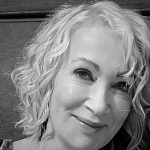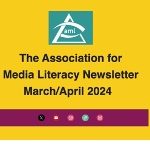Additional Qualification
Media Parts 1, 2 and Specialist
Course Details

When/Where does the course run?
- Dates: Parts 1, 2, and 3 (Specialist) concurrent AQ concluded on December 14 2023.
- Location: 10 weekly synchronous 2.5 hr evening sessions.
- Course Model (as required by Ontario Regulation 176/10): 125 hours = 100 hours including synchronous meetings & assigned work; 25 hours non-monitored independent work

What does the course cost?
- $700 CAD (tax deductible in Canada)

How do I register?
- Watch this space for information on the 2024 AQ course/s offering/s. Please email us if you require more information.
About the Part One Course
“I found that it made me a lot more observant about the media around me. I couldn’t help but notice media and all the key concepts – everywhere…” – Diana M
“I’m a Grade 1 teacher . . . I had quickly grown to love the course. It taught me to rethink how I think, and how I teach, and how I interact with others. And I believe that this course has not only made me a better teacher but a better person …” – Amanda Bujdos, Toronto, Ontario, Canada
Media are the oceans in which we live and communicate. Sometimes calm; sometimes turbulent; always changing. As with oceans, we need media but must know how to navigate and use them. This is why media literacy is the most important skill, and why we cannot be too media literate.
Teachers need to know and exercise media literacy because students learn and demonstrate their learning via media. AML knows Ontario’s media literacy curriculum because we wrote it, making Ontario the first educational jurisdiction in the world to mandate media studies in every core English/Language course.
Our instructors have worked in K-12 classrooms, and we employ our exceptional colleagues as guest speakers and mentors. We seek out and collaborate with global scholars and classroom teachers on the cutting edge of media literacy education, combining pedagogical theory and its grounding practice.
We recognize the challenging work/life balance of teachers, so there is much opportunity to apply your learning practically and immediately to your own classroom.
What will you gain from this course*?
- you will learn how to develop lessons from unfolding media environments and experiences
- you will build a personal collection of resources and lessons
- you will learn to integrate critical thinking about equity and social justice into Secondary and Grades K-8 cross-curricula
- you will learn to integrate critical thinking about pop culture, social and informational media, digital technologies, and literature (& more) into Secondary and Grades K-8 cross-curricula
- you will refine/expand your media production skills & those of your students
- you will learn how to integrate media production (image, video, audio) into your practice, in order to enhance and support reading, writing, speaking, listening, group, research and media literacy skills
- you will learn how to assess and evaluate students’ media literacy work
- you will have FUN!
*Registrants must have wi-fi, software and hardware to operate Google Meet.
This is an Ontario Schedule D course. It is QECO and OCT-approved.
It is currently the only Media AQ being offered in Ontario.
- Successful OCT members in Part 1 will have Additional Qualification Media, Part 1 added to their teaching qualifications. Non-OCT members will receive AML certificates
- Part 2:
- The Part 2 course is offered as a standalone course, concurrently with Part One and Specialist (Part 3)
- Candidates registered in Part 2 will deepen and extend their Part 1 skills through collaborative and leadership experiences
- The Part 2 experience will offer greater flexibility and independent choice
- OCT member participants registered in Part 2 will receive a Part 2 Qualification. Non-OCT members will receive AML certificates
- Part 3 (Specialist):
- The Part 3 course is offered as a standalone course, concurrently with Part One and Part Two
- Contact us at associationformedialiteracy [at] gmaildotcom if you are interested in the Specialist level.
Read OCT’s prerequisites for the AQ certificates.
Note on refund/withdrawal policy: No course refunds are issued after the first week of the course. Please contact us for further details.
How will you learn?
You will use collaborative inquiry, presentations and online tools to build a collection of current and personalized media-teaching strategies, including hands-on experiences, inquiry, creativity, media production, self-directed learning, assessment tools and strategies, collaboration, team-teaching and global citizenship to support your ongoing practice. You will hear and discover experienced guest media teachers share their current challenges and successes. And you will have private, one-on-one consultation access to course instructors as needed, in a setting with a maximum of 30 learners.
What are the major tasks?*

A media literacy log documenting, connecting, and reflecting on class experiences.

A collection of personal, annotated media literacy resources.

A media production in the teacher’s choice of medium and content.

Presentation of a personally-constructed media literacy lesson.
*modified/enhanced for Parts 2 & Specialist
Who will you learn from?

Neil Andersen – OCT, M. Ed.
President of The Association for Media Literacy (Ontario)
@mediasee
Neil has taught primary to post-secondary media studies for over 30 years, including Media Studies Additional Qualifications courses for Mount Saint Vincent University, York University, the University of Toronto and the Toronto District School Board. He has given keynotes and workshops across Canada, in the US, Japan, India, China, Australia, England and Sweden.
He has made movies and videos, authored student textbooks, journal articles, teacher resource books, over 200 study guides, and designed T-shirts, posters, interactive CDs, websites, online courses and programs. He co-hosts Mediacy, a weekly media literacy podcast on VoiceEd Radio.
His awards include the Jesse McCanse Award (International Council for Media Literacy) and The Magic Lantern Award (The Association for Media and Technology in Education).

Carol Arcus – B.A, B.Ed, M.A.
Director in The Association for Media Literacy
@arc3
Carol taught secondary level Media Studies and English in Ontario for 20 years. She has also taught Additional Qualifications courses for teachers in Media Studies for the Ontario Institute for Studies in Education (OISE) and for the Toronto District School Board. She currently serves on the Advisory Committee and Board of the McLuhan Foundation, and co-podcasts Mediacy regularly with Neil Andersen.
Carol has published articles in the Journal of Media Literacy and the Media Education Research Journal and given numerous workshops and presentations on how to integrate media literacy into curriculum. She served on the writing and review committees for two iterations of Ontario’s media literacy curriculum.

Michelle Solomon – B.A, M.A.
Director in The Association for Media Literacy
Michelle Solomon (she/her) is a Media Specialist currently teaching in the TDSB. She received her M.A. in English from McMaster University, and is interested in both Library and Cultural Studies. Michelle has facilitated workshops and has presented at numerous conferences in Canada and the United States. Her work in the last several years has focused on Antibias and Antiracism, Decolonization and addressing the Right to Read report through Media Studies. Her work has been most recently published in Media Literacy for Justice: Lessons for Changing the World by Belinha S. De Abreu.



